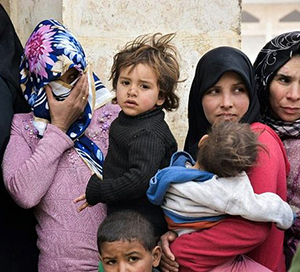Manbij (Syria), Mar 4: Tens of thousands of Syrian civilians have fled ferocious fighting between Russian-backed regime forces and Islamic State group jihadists over the past week in the country's ravaged north. Supported by Russian air power and artillery, Syrian government forces have waged a fierce offensive against IS, seizing around 90 villages from the jihadists since mid-January.
Their aim, according to the Syrian Observatory for Human Rights monitoring group, is IS-held Khafsah, the main station pumping water into Aleppo. Residents of Syria's second city have been without mains water for 47 days after the jihadists cut the supply.
The fighting over the past week has sparked an exodus of "more than 30,000 civilians, most of them women and children," Observatory head Rami Abdel Rahman said Saturday.
Most of the displaced went to areas around Manbij, under the control of the Syrian Democratic Forces (SDF), an alliance of Kurdish and Arab fighters backed by the United States that is also fighting IS, the monitor said. An AFP correspondent in Manbij saw dozens of displaced families speeding towards the relative safety of the town on motorcycles and in small buses and cars.
Many of them looked exhausted as they lined up at a checkpoint manned by the Manbij Military Council, the SDF unit that controls the town, to be searched and get permission to enter.
Ibrahim al-Quftan, co-chair of Manbij's civil administration, told AFP that as many as 40,000 displaced people had arrived in the town in recent days. "The numbers of displaced people here are still rising because of the clashes between the Syrian regime and Daesh (IS)," Quftan said.
"These people are suffering very difficult circumstances." Manbij is already hosting "tens of thousands of displaced people that fled previous clashes in the area and are living in difficult circumstances," according to Abdel Rahman.
"This will make it difficult (for local authorities) to welcome a new wave of displaced people, given their inability to tend to their pressing needs," he said. Since civil war broke out in Syria in March 2011, more than half of its pre-war population has been forced to flee their homes.
The northern province of Aleppo hosts tens of thousands of displaced Syrians, many in camps near the border with Turkey. Rebel backer Ankara sent its own troops into Syria in August to fight IS jihadists as well as Kurdish units in an operation dubbed "Euphrates Shield."
Turkey considers the Kurdish People's Protection Units (YPG), which makes up most of the SDF, a "terrorist" group because of its ties to outlawed Kurdish militia in southeast Turkey. On February 23, the Turkish-backed rebels of Euphrates Shield captured the town of Al-Bab, which had been IS's last remaining bastion in Aleppo province.





Comments
Add new comment